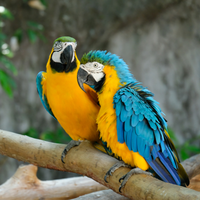Pet Bird Day is September 17th! One of the most beloved and charismatic birds is without a doubt the Macaw. Polly has been our buddy since at least 1100 AD: around that time, the Pueblo Indians became friends with the Scarlet Macaw. A local Fayetteville, NC vet discusses caring for these boisterous, beautiful birds below.
Basics
There are several different types of Macaws: Polly’s family includes 17 species and several subspecies. However, they are loosely split into two groups: large and minis. The largest is the Hyacinth Macaw, with a wingspan of 42”, while the littlest is the Hahn’s Macaw, whose wingspan is just under a foot.
Longevity
Macaws are quite long-lived. Their average lifespan is between 35 and 60 years for large and hybrid Macaws, and between 20 and 25 for the minis.
Cage
Macaws need quite large cages, so plan accordingly. These guys are great climbers, so choose a cage that is more tall than wide. This is a one-time expense, so it’s definitely something worth splurging on a bit. Polly will also need plenty of fun toys and perches. Ask your vet for recommendations.
Food
A good diet is crucial! Wild Macaws eat seeds, fruits, flowers, nuts, and nectar, so pets’ diets should reflect that. It’s worth noting that they need more fat than other parrots. Ask your vet for specific advice on this.
Identification
Because Polly could fly off—perhaps simply by slipping out an open door—it’s important to have identification. Spray marking, tattoos, microchips, and bands are a few options.
Personality
Macaws are very fun pets, and form very strong bonds with their humans. You may be able to teach Polly to speak! They tend to do well with children, and often get along with other pets. However, they can be dangerous to small animals, like hamsters. They’re also quite loud, which is definitely something to think about before adopting one. Consider the rest of your household before adopting one of these colorful birds.
Training
Proper taming and training is very important for Macaws. The larger ones are strong enough to cause serious damage from bites. Socialization is crucial here. Polly should get used to being handled while she’s still young. Nip bad behaviors in the bud: otherwise, you’ll have a feathered ball of chaos on your hands.
Do you have questions about Macaw care? Contact us, your Fayetteville, NC animal clinic!





